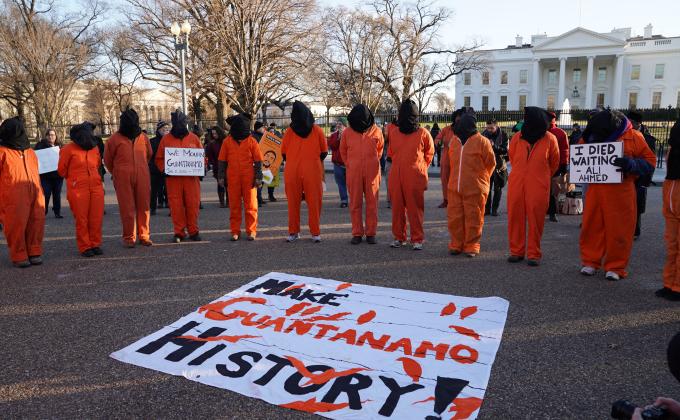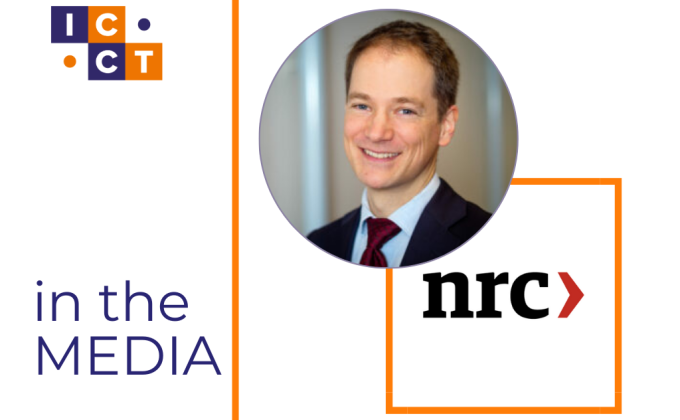Nearly two years after the fall of Baghuz, the last remaining ISIS-held territory, hostilities and terrorist attacks continue in North East Syria. The region is administrated by the Autonomous Administration of North and East Syria (AANES) with its unified military force, the Syrian Democratic Forces (SDF). According to a recent report 64,000 people are still being held in the Al-Hol camp alone which is administered by the Kurdish-led SDF. In this camp, over 80 percent are women and children, nearly half of them are Iraqi, 37 percent are Syrian, and 15 percent have a foreign nationality. According to UN experts, the combined humanitarian situation and increased presence of ISIS-related threat in the squalid camps has led to more violence, accidental deaths, and the murder of 12 persons in January alone with more reported since, making the continued presence of the women and children even more untenable. With many European countries still reluctant to repatriate their foreign fighters and families, prosecution by Syrian and Iraqi courts not considered as meeting international human rights standards, and slim chances of establishing an international tribunal in the region, the AANES have prosecuted local ISIS fighters in temporary courts and tribunals. As part of this process, the AANES announced they would be trying thousands of ISIS fighters in 2021 according to local laws.
In this perspective we will analyse whether the AANES, which have been a de facto autonomous region since 2012 can legally prosecute ISIS fighters. Secondly, we will examine the crimes the ISIS suspects are being prosecuted for; the evidence being used; the sentences handed down; and how these trials meet international human rights standards. Finally, we will assess the short- and long-term implications for holding these local fighters and potentially foreign fighters accountable under the Kurdish legal system.
Can AANES prosecute ISIS fighters legally?
Armed groups have frequently set up their own courts, examples include the Communist Party (CPN-M) in Nepal, the Liberation Tigers of Tamil Eelam (LTTE) in Sri Lanka and the Mouvement de Libération du Congo (MLC) in Congo. Armed groups - directly or through their civilian administrations - have set up courts for various reasons ranging from strengthening their claim of legitimacy, to maintain law and order in an area controlled by them, or to specifically prosecute their own fighters for violating international humanitarian law (IHL).
Before addressing how these courts administer justice, the first question is whether armed groups can, under IHL, legally set up such courts and whether any specific criteria need to be met in doing so. One of the basic rules of IHL is that both parties in a conflict are bound by IHL regardless of whether the rules of jus in bello have been violated. Looking at the language of common Article 3 it clearly applies to all parties to the conflict; this includes non-state armed groups (NSAGs). Various United Nations Security Council resolutions, including UNSCR 2139(2014) on Syria, call on both parties in the conflict to respect IHL. The legal classification of the armed conflict determines which set of rules of IHL is applicable. Multiple conflicts are currently taking place in Syria, which includes an international armed conflict in both the US-led coalition against ISIS and the hostilities of Turkey against the Kurds in Syria. The conflict between the SDF and ISIS, and between the SDF and the Assad regime, however can be classified as a non-international armed conflict.
The most pertinent question at present is whether the SDF, a NSAG, can legitimately administer justice and therefore the focus will be on IHL rules applicable during a non-international conflict? According to common Article 3 of the Geneva Convention each party to the conflict is prohibited from ‘passing sentences and carrying out executions without previous judgment pronounced by a regularly constituted court, affording all the judicial guarantees which are recognized as indispensable by civilized peoples’. A similar provision can be found in Article 6 of the Additional Protocol II (APII) to the Geneva Conventions, although references to regularly constituted courts are replaced with ‘a court offering the essential guarantees of independence and impartiality’ and a list of minimum requirements is specified.
Although Syria has not ratified APII, the judicial guarantees listed in Article 6 are considered customary law (general practice accepted as law by states independent of treaty law). Article 8(2)(c)(iv) of the Rome Statute criminalises common Article 3 of the Geneva Conventions, and according to the elements of the crimes also refers to essential guarantees of independence and impartiality. Ensuring independence can be challenging in particular for some (smaller) armed groups, and implies that a court should be able to perform its functions independently of any other branches of the government. The courts in North and East Syria are established by the civilian authority AANES and would require independence from both the administrations’ political and military branches. While many human rights treaties, such as Article 14 of the ICCPR, refer to the right of fair and public hearing by a competent, independent and impartial tribunal ‘established by law’, both common Article 3 and Article 6 of the APII do not refer to the need that such courts are ‘established by law’. This would also practically be unfeasible for NSAGs. Thus, it appears that IHL does not explicitly authorise NSAGs to establish courts, but does regulate and provide certain minimum judicial guarantees that need to be met, without having a basis in national law.
How do the trials conducted by Rojava courts look, and do they meet international human rights standards?
The AANES claim they are not aiming to establish an independent state, but are looking to retain some autonomy in the Syrian federal system. So far, however, there have been no substantive talks with the Syrian government over the region's status. With a population of two million people, the main reasons for the AANES to hold trials appears to be to provide justice for the victims and to manage the continued security threat posed by ISIS. After the territorial defeat of ISIS two years ago, they are gaining strength in particular in North-East Syria. In January 2021 alone, over one hundred attacks were carried out by ISIS members ranging from bombings, to ambushes, and kidnappings.
In developing the Rojava criminal justice system, efforts have been made to implement liberal processes more in line with international law. The AANES has founded a constitution and a legal system of its own which includes a ban on the death penalty, a ban on extradition to death penalty countries like Iraq, inclusion of female judges, and a system of restorative justice. The new justice system also combines accountability with other forms of transitional justice, such as ongoing release under the tribal guaranteed programmes, and amnesties, alongside rehabilitation efforts in detention facilities. Torture is also prohibited in the Rojava justice system, and disciplinary action is supposed to be taken against any guards perceived to be acting in contravention of this ban or humiliating prisoners.
Types and number of crimes
The insights of how trials are conducted are based on an interview with a Prosecutor at the People’s Defense Court of Qamishlo that the ICCT conducted in close collaboration with Rojava Information Center. [1] Up until 2021, AANES courts have already tried and sentenced around 8,000 Syrians suspected of belonging to ISIS and affiliated groups such as Jabat al-Nusra, and also factions of the Turkish-backed Syrian National Army such as the Hamza Division and the Suleyman Shah Brigade. Whether the rights-focused ideals laid out above are implemented in practice during trial processes remains difficult to assess. So far, no Iraqi or foreign nationals have been tried.
According to the interviewed Prosecutor, the most common crimes that persons are tried for are civilian and armed membership of a terrorist organisation, murder, rape, and human trafficking. Furthermore, persons can be charged for acts of organised leadership such as giving orders to carry out executions for which the sentence is between 20 years and life imprisonment. The concept of command responsibility appears to apply and holds persons accountable who have indirectly been responsible for the death of people, but no further information is available including which conditions need to be met to be considered command responsibility, and whether this complies with the concept under international law.
An interesting observation is the distinction between civilian and armed membership of a terrorist group in these charges. This seems to take into account the gravity of the crimes, which is reflected in the sentences of one to two years for civilian membership (cooks, drivers, recruiters) compared to five to ten years for armed membership where violent acts are committed, increasing to an indefinite sentence if there is proof the suspect killed an SDF soldier. One of the criticisms of vague catch-all membership offences is that no distinction is made between active and passive membership, nor in the severity and types of crimes that have been committed, leaving it up to the discretion of the prosecutor whom to prosecute. Sentence reductions of up to three years can be awarded both before and after the committal of an offence if the accused surrenders and supplies information. If information is offered prior to a targeted assassination or bombing, the suspect may avoid jailtime altogether.
One of the pressures affecting the administration of proper due process is the sheer number of cases faced by the Kurds. Accounts of the number of trials that have already taken place differ but an account given by an administrator at one of the courts in the city of Qamishlo, stated that between the years 2014-2019 the three Kurdish terrorism courts in the cities of Qamishlo, Afrin, and Kobanê had tried 1,500 cases, with another 4,000 Syrian fighters awaiting trial. If accurate, this pace would mean it would take thirteen years to clear the backlog before focus could be turned to the FTF cases, a process in which the AANES has been requesting the international community play a role.
ICCT spoke with a member of an official Swedish diplomatic delegation with special envoys to the region. They confirmed that, despite a claim by the head of the AANES office for internally displaced persons and refugees, Sweden would not be playing a role in the trials, and claimed that the default position of many European governments is to avoid overt assistance or collaboration with the AANES due to political considerations. As a result, the approach of the AANES has changed from asking for the international community to play a role in the trials to asking them to provide coaching and support to help them maintain standards of due process such as provision of defence lawyers.
Right to defence
Human Rights Watch visited the Rojava sites in 2018 and explained that at that time the justice system was an extremely rudimentary one with no right to defence, and no court of appeal. According to the interviewed Prosecutor and representatives from within the administration, however, progressive steps have since been taken to rectify these prior shortcomings. It is claimed that defendants now have the right to defence counsel who has full access to the prosecution’s file and that this right is always clearly communicated to the individual but that there are practical difficulties in finding individuals willing to defend those accused of belonging to ISIS and committing massacres. In situations where the defendant requests a lawyer, but is unable to instruct one themselves for financial reasons, the AANES claim that they will either provide the necessary funds to obtain a lawyer, or contact the ‘Lawyer’s Union’ to request their assistance who will then send a representative. A second court independently assesses appeals on facts and law with 60 percent of cases being appealed by the accused.
However, additional barriers to these trials include limited prison capacity and conditions, difficulties in gathering evidence, and the limited forensic capability of the AANES to analyse evidence, as it has been repeatedly acknowledged that they do not have forensic labs or the capacity to analyse fingerprints or any kind of DNA evidence. Limitations of technical capabilities can also prove an issue since much of the pertinent evidence is recorded on devices such as smartphones which they sometimes have difficulties in searching. The AANES Internal Security Force, also known as the Asayish, are sometimes able to overcome this technological barrier in their investigations as some suspects reportedly remain proud of the actions they consider legitimate, meaning the Asayish can recover video evidence of killings, rapes, and decapitations from the suspects’ own phones.
Custody of suspects and prisoners
This perspective does not address whether NSAGs have the power to detain under IHL but focus on the conditions of detention. Whilst at the courts, prisoners are held in collective cells of 20 to 25 people in conditions which the interviewed Prosecutor for the AANES conceded were overcrowded due to the administration lacking in facilities. These conditions have led to the AANES issuing amnesties to offenders convicted of non-terror related crimes in order to relieve the overcrowding. The AANES claim that there have been two instances in which such amnesties have also been granted to terror-related prisoners, the first in 2016 and the second in October 2020 when 631 convicted terrorist offenders were released. The amnesty was said to be only available for those guilty of less serious crimes, the sick, and over-75s whilst an additional 253 prisoners guilty of serious felonies (excluding rape crimes, honour killings, and senior terrorist leadership crimes) saw their sentences halved, with life sentences reduced to 20 years. A commitment was also made that those who are yet to be sentenced will benefit from the amnesty decision after their trial. In order to grapple with the inhumane detention conditions, some countries appear to be offering assistance to improve the detention facilities.
The failure to charge anyone with war crimes, crimes against humanity, or genocide
The obligation to prosecute or extradite and universal jurisdiction are two distinct tools that both address impunity for the most serious crimes, such as war crimes, crimes against humanity, and genocide. Under customary law, states have an obligation to establish universal jurisdiction over offences considered grave breaches while they have a right to assert jurisdiction over other war crimes, crimes against humanity, and genocide. Similarly, through its prosecute-or-extradite provision, the Convention on Torture provides for an equivalent of universal jurisdiction and state obligation over torture. There appears to be no conventional basis however for the obligation to prosecute or extradite for crimes against humanity, genocide, war crimes other than grave breaches and war crimes in non-international armed conflict.
However, under customary law, States have the obligation to investigate and prosecute war crimes committed by their nationals or when committed on their territory which is applicable in both international and non-international armed conflicts. It should be noted that the aforementioned obligations to prosecute or extradite war crimes and torture are only applicable to states, and that neither Syria nor Iraq have implemented international crimes in their domestic legislation. This means that they are neither obligated nor able to prosecute some suspects for the specific crimes they have committed. Despite these limitations, one point of progress can be seen in the Iraqi parliament which passed a law that formally recognizes the genocide against Yazidis and offers reparations to all female victims. Furthermore, legislative steps have been taken in Iraq to provide a legal basis for the prosecution of ISIS members for war crimes, crimes against humanity and genocide.
Since the conventional law-based obligation to investigate and prosecute war crimes seemingly applies specifically to states, the question becomes whether this obligation also extends to NSAGs and their civilian administration. There appears to be no such obligation, although according to some, a trend towards such an obligation might be emerging. It would nevertheless be important not only to determine whether such an obligation exists legally, but also take into account the willingness and ability of NSAGs to prosecute war crimes. It appears from the interview, that the AANES courts are currently not able to prosecute international crimes, including war crimes. What is clearer is that the ‘extradite’ limb of the ‘prosecute or extradite’ principle cannot be applicable to NSAGs as they are not a recognised state and could therefore not engage in or conclude extradition agreements. It is unlikely that convictions of FTFs by AANES courts would trigger the ne bis in idem principle which would prevent persons being charged twice for the same crime, or that the convictions would be recognised by their home states.
Where can ISIS fighters, including FTFs, detained by the SDF be prosecuted?
In an earlier perspective, we looked at the possibilities of prosecuting ISIS fighters in Syrian and Iraqi courts. Both these countries can assert jurisdiction because the majority of detainees in the camps have Syrian or Iraqi nationality. Trials administered by the Syrian regime are not an internationally popular option, however, due to the prevalence of pre-trial torture, lack of due process, mass executions, a lack of independent courts, and a system of secret prisons which holds Syrians, Iraqis, and other foreign prisoners. Additionally, the lack of effective control of the Syrian government in North and East Syria poses an even bigger challenge to investigate and prosecute ISIS fighters.
Despite the efforts of Iraqi authorities to bring Iraqi ISIS fighters to justice, they face several legal impediments and many fair trial criticisms regarding their terrorism-related trials which often lack credible evidence and see convictions based on confessions frequently obtained through torture. Yet, the most significant barrier to international support for trials conducted in Iraq is the continued use of severe sentences and the death penalty on both Iraqi citizens, and FTFs. In trials that took place in Iraq in February of 2018, 655 of the 758 defendants were given sentences in excess of 15 years, of which 203 were sentenced to death.
The countries to which FTFs originally belong to could also prosecute suspects in their domestic courts on the basis of the nationality principle or universal jurisdiction. A few countries like Bosnia, Kosovo, Kazakhstan, and Uzbekistan have opted for this solution but the majority of Western countries have not done so. Instead, some states have a preference for their FTF citizens to be tried locally in Iraq or Syria, and even by the AANES in the case of France.
Considering the many challenges the AANES face in managing the large number of detainees in the camps, they had previously been advocating for repatriation of FTFs to their country of origin and/or the establishment of an international tribunal to try ISIS suspects. Though this option would potentially overcome the capability and jurisdictional challenges mentioned above, it has failed due to political and legal differences.
Conclusions
While all other options of bringing the ISIS members, including FTFs, in the SDF camps to justice seemingly fail, it is time to look more seriously at prosecution by the Rojava courts. It is clear that IHL implicitly allows NSAGs to establish courts, provided that they meet certain minimum requirements.
The ICRC has stated that whilst the establishment of courts by NSAGs such as the AANES/SDF raises issues of legitimacy, it does constitute an alternative to summary justice and is a possible way for armed groups to both maintain law and order and ensure respect for IHL, a responsibility asserted by the UN Security Council on multiple occasions. While in most cases NSAGs may have neither the capacity nor the desire to conduct trials in compliance with international law, in the exceptional circumstances when NSAGs have the ability to administer justice in accordance with international fair trial standards, they should be supported.
For the AANES, holding trials is the only viable solution - with or without the help of the international community - to contain the threat posed by ISIS and to provide justice including through transitional justice mechanisms. In an interview conducted by the ICCT with a Swedish diplomat, he confirmed that the AANES fully acknowledge their shortcomings which range from overcrowded prisons, the lack of systematic rehabilitation programmes in prisons, and challenges in meeting fair trial standards. But they are nevertheless determined to deliver justice to the best of their abilities and assistance from the international community would greatly aid in their aims.
At the end of the month, the European Union and the United Nations will be hosting the fifth Conference on the future of Syria and the region. Clearly, the Syrian conflict requires a political solution, but there is no lasting peace without justice. In the previous conference, accountability and justice were just briefly mentioned focusing solely on international efforts such as the International Impartial Independent Mechanism for Syria, and the International Independent Commission of Inquiry for Syria. It is now necessary for the international community take a more comprehensive approach and support international, national and other accountability efforts to provide justice, including rehabilitation efforts. The ultimate objective is to ensure that whatever combination of accountability measures are adopted, it is designed and implemented in a way which can contribute to restoring the rule of law, adhere to international human rights standards, and provide justice to the victims.
[1] The prosecutor has not been named at their request for security reasons.
The full interview with the Rojava Information Centre can be found here.









